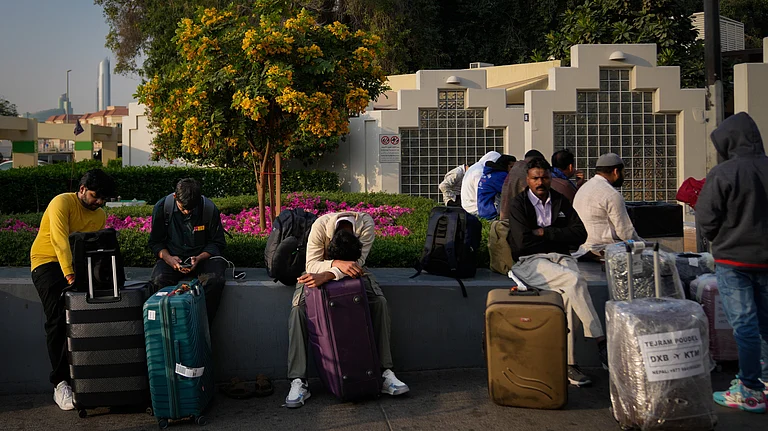AFTER having co-sponsored the move along with the US for just such a pact in 1973, and then again in 1993, why is India now reluctant to sign the Comprehensive Test Ban Treaty (CTBT)? The official Indian line against signing on the dotted line at the Conference on Disarmament (CD)—which ends in Geneva on June 28—is that the treaty in its present form is discriminatory and does not address India's concerns. Also, New Delhi argues that with the end of the Cold War, its threat perception has changed.
Basically, the treaty aims at freezing the nuclear capabilities of all signatories at their existing levels. And it seeks to do so by imposing a ban on tests, peaceful or otherwise. India feels that given the vast disparity in fissile technology between the five nuclear weapon states—the US, France, China, Russia and Britain—and those who would like to "retain the option", such a ban is blatantly biased.
Add to that Washington's dismissal of India's repeated appeals that the ban be accompanied by a time-bound, general and complete disarmament of the five nuclear powers, and things begin to look even more sinister. Cries of 'conspiracy' and 'imperialist arm-twisting' fill the air.
But what exactly is the Government going to do about it? The Deve Gowda dispensation is yet to take a final decision. But External Affairs Minister I.K. Gujral says his Government will stick to the earlier Congress government's stand, which was that India would not comply unless the CTBT was linked to the elimination of all nuclear weapons worldwide.
Arundhati Ghose, India's ambassador to the United Nations in Geneva and chief CTBT negotiator, has rejected the draft treaty presented by Jaap Ramaker, chairman of the ad-hoc committee negotiating the treaty, saying it "does not meet our concerns". Senior officials at the External Affairs Ministry decline comment, noting that negotiations are still on, but admit India will have to make up its mind soon.
Meanwhile, unofficial views abound. "Walk out," asserts defence analyst K. Subrahmanyam. "With the tabling of the draft-final text of the treaty late last month, the time for negotiations is over." The CTBT, he says, is mainly aimed at shackling India and Pakistan. The two countries have refused to sign the Nuclear Non-Proliferation Treaty (NPT) which, among other things, bans nuclear testing in any form.
Adds Subrahmanyam: "We have a certi-fied nuclear power (China) and a threshold power (Pakistan) as neighbours. That China managed to sell nuclear ring magnets to Pakistan without inviting immediate US action indicates that the NPT is totally ineffective. So if India signs the CTBT, which is an irrevocable step, and then China later sells complete nuclear missiles to Pakistan, what is India going to do about it?" Pakistan has so far refused to sign the CTBT unless India does so. "The US has dug a grave for us and is now asking us to jump into it so that it can bury us," he says. "After walking out of the CD, India will be able to negotiate from a position of strength."
Institute for Defence Studies and Analyses Director Jasjit Singh concurs: "India should comply only if the CTBT is linked to a time-bound disarmament plan. It's essential to have a 'good' CTBT without loopholes and with effective verification systems."
Opinions differ, however, on what India should do if it does not sign the treaty. Should it opt to keep all "options open"? Or, should it, as the BJP advocates, go openly nuclear?
"Of course we should go nuclear," says C.Raja Mohan, strategic affairs editor at The Hindu. "But first, we should walk out of the conference, since other countries like China, Russia and Britain are likely to label us as spoilsports while refusing to sign until we do."
Regardless of what New Delhi does after June 28, conventional wisdom in India seems against signing the CTBT. But, braving the risk of being labelled politically incorrect and stooges of the US, a small band of academics and experts has put up strong arguments for India signing the treaty.
Journalists-turned-scholars Achin Vanaik and Praful Bidwai, who have co-authored Testing Times: The Global Stake in a Nuclear Test Ban, a book brought out by the Dag Hammarskjold Foundation, are among them. "Self-righteous sanctimonious crap," is how Vanaik describes the reasons doing the rounds against signing the treaty.
India, they assert, is hesitant to sign the treaty mainly because it would formalise its so-called nuclear asymmetry with China. By signing the CTBT at this stage and in its present form, India would forfeit forever the ability to build a credible deterrent to Beijing's perceived designs. The only way of formulating such a deterrent is to go openly nuclear first. And even then, it must be remembered that China has a 25-year lead over India in the production of nuclear weapons.
"Who needs to catch up?" counters Raja Mohan. "The beauty of nuclear weapons is that, unlike conventional arms, just having a few warheads is a very powerful deterrent."
Kanti Bajpai, associate professor at the School of International Studies at Delhi's Jawaharlal Nehru University, gives the whole issue another twist. He says that by not signing the CTBT, India will give the hawks among the nuclear weapons nations like the US a powerful ground to insist on further upgrades of their own weapons systems. This in turn might take us right back to the dark days of Ronald Reagan and his Space Defence Initiative a.k.a. Star Wars, sparking off a new arms race.
But, by signing the CTBT and thereby capping our own as well as Pakistan's weapons programmes, Bajpai says we would be in a far superior position in terms of security, since we would then be dealing in terms of conventional weapons. "It is only the bomb which has made Pakistan an equal to us in terms of military might," he says. But the flip side is: Pakistan too might be thinking the same way.

















